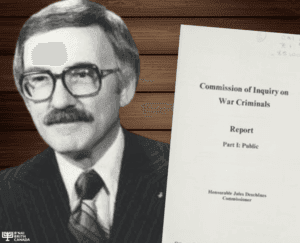
December 19, 2024
OTTAWA – B’nai Brith Canada is appealing Library and Archives Canada (LAC)’s decision not to declassify information on suspected Nazis who settled in this country after World War II.
“The overall public interest clearly favours disclosing historical information with respect to the Government of Canada’s response (or non-response) to suspected Nazi war criminals who immigrated to Canada after World War II,” B’nai Brith said Thursday in a joint statement.
The statement was signed by 39 academics and institutions such as the Canadian Historical Association and the Montreal Holocaust Museum.
“Historians and the Canadian public generally have not yet been afforded access to the Deschênes Commission’s detailed findings and case-specific recommendations. Release of this information is vital,” it says.
The joint-statement is a demonstration of public support for B’nai Brith’s efforts to reverse LAC’s refusal our latest Access to Information Request (ATI) to obtain the full and unredacted 1986 Deschênes Commission final report. This Commission, named for its chair, Justice Deschênes, investigated allegations that Canada had permitted suspected Nazi war criminal to enter the country in the immediate post-war period. David Matas, B’nai Brith’s Honourary Senior Legal Counsel, represented our organization before the Commission and signed Thursday’s joint-statement.
“We must prevent history from repeating itself,” said David Granovsky, B’nai Brith Canada’s Director of Government Relations. “It is imperative that everyone understands the degree to which this country was complicit in enabling Nazis to escape accountability for their crimes.
“The need for the full disclosure of the Commission’s report was unfortunately made clear by the Hunka Affair,” Granovsky said, referencing a September 2023 scandal in which Parliament inadvertently gave a standing ovation to Yaroslav Hunka, who reportedly served in the 14th Waffen SS Division during World War II.
B’nai Brith reiterated its call for LAC to unseal the Deschênes report immediately after the Hunka debacle. In February 2024, the Government partially acquiesced by releasing most of a 1987 study produced by historian Alti Rodal.
Rodal’s work, largely based on materials that are still classified, was the first to hint at the extent to which Canada provided a haven to former Nazis.


